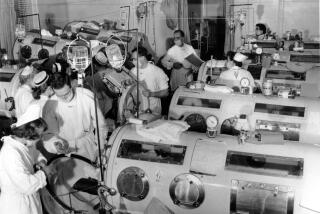Salk Vows to Act as Guinea Pig for Untried AIDS Vaccine
- Share via
Dr. Jonas Salk, famous for developing a landmark vaccine for polio, said in a report published Thursday that he would inject himself with an experimental AIDS vaccine before the end of the year.
“I want to answer the implicit question, ‘Would you take it yourself?’ ” the 76-year-old Salk told the San Diego Union. “Since actions speak louder than words, that’s the obvious thing to do.”
Salk, who recently attended an AIDS conference in Florence, Italy, was in Paris on Thursday and unavailable for comment. A spokeswoman for the Salk Institute in La Jolla said the switchboard was flooded with calls after Salk’s comments were published.
Calls were referred to the Immune Response Corp. of Carlsbad, which Salk, a current board member and shareholder, co-founded in 1986 to research a vaccine for AIDS.
Steven Basta, a spokesman for the firm, said Salk’s comments “overemphasized something that’s not a primary focus of the company. Our focus is to target the already-infected AIDS population. That’s where our emphasis and dedication lies. The other matter (a vaccine for an uninfected population) is not what we spend our time thinking about.”
However, Basta conceded that if a vaccine for an uninfected population is tested--and the company has applied for permission through the state Health Department to begin such testing--Salk would be one of several volunteers on whom the vaccine would be administered.
Basta said what remains uncertain is when the program would start.
“The trial for an AIDS vaccine, to be used on uninfected patients, is not about to start, and at this point is only a maybe anyway,” said Basta, a former researcher who now works as assistant to the president of Immune Response Corp.
Basta said that, when the vaccine is tested, Salk will “be injected with a killed virus vaccine. That would be similar to what he did in the past with an influenza vaccine. Such a practice has gone on throughout the history of medicine. Physicians and scientists often participate in safety tests to demonstrate confidence in the product.
“We expect that the trial is going to happen (referring to the AIDS vaccine for the uninfected), but it’s really up in the air as to when. At this point, our efforts are 100% focused on nationwide clinical trials for patients already infected with the HIV virus.”
Officials for Immune Response Corp. say they have begun the application process with the state Health Department for permission to test a compound on 10 to 15 uninfected people. Basta said Immune Response Corp. “doesn’t do anything without Dr. Salk being involved every step of the way.”
Salk told the Union that he injected himself with an influenza vaccine that he worked on in 1942, and personally tried out his famous polio vaccine in 1952.
Basta said recent tests on monkeys have led to hopes that “an effective vaccine for an uninfected population can be developed based on a killed virus, similar to the vaccine that’s being used as a therapy now (on patients already infected with the human immunodeficiency virus).
“It prompts us to want to explore a vaccine for the uninfected population,” Basta added. “But the critical need we see now is in the 1 million to 2 million already infected patients that will eventually progress to AIDS if there is no new therapy. Our product may prevent those patients from ever developing AIDS.”
Basta said the AIDS-related vaccines being researched by Immune Response Corp. is “a killed virus vaccine similar in structure to a traditional vaccine for smallpox, measles, mumps, polio. . . . Many of those killed viruses are then injected into the body so that the immune system can learn to respond and attack the virus.
“With already infected patients, the virus we inject tends to invade the immune system, boosting the immunity of the already infected patient. It enables the immune system to recognize and vigorously attack the virus.
“The process can also be used on the uninfected, and there is a lot of appeal based on animal research, but a final decision just hasn’t been made. And we don’t know when it will be.”






